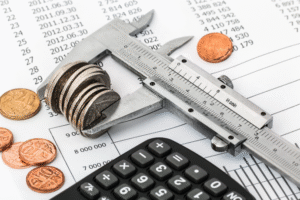Dealing with debt can be overwhelming, but taking steps to get out of debt is a commendable decision that can lead to financial freedom and peace of mind. However, navigating the path to debt relief isn’t always smooth sailing. Many individuals make mistakes that can hinder their progress and prolong their journey to becoming debt-free.
In this article, we’ll explore some common pitfalls to avoid when working to eliminate debt.
9 Common Mistakes to Avoid When Trying to Get Out of Debt
To successfully get out of debt, it’s essential to identify and understand the common mistakes that individuals often make.
By being aware of these pitfalls, you can steer clear of them and make more informed decisions on your journey to financial recovery.
- Neglecting to Create a Realistic Budget
- Ignoring High-Interest Debts
- Overusing Credit Cards
- Neglecting an Emergency Fund
- Falling for Quick-Fix Solutions
- Disregarding Professional Help
- Forgetting to Track Progress
- Neglecting Self-Care
- Not Seeking Accountability
1. Neglecting to Create a Realistic Budget
When it comes to managing your finances and paying off debt, a well-structured budget is your best friend. Failing to establish a realistic budget can sabotage your efforts to become debt-free.
A budget helps you understand your income, expenses, and where your money is going. Without a clear picture of your financial inflows and outflows, it’s challenging to allocate funds effectively to pay down your debts.
Imagine you’re trying to get out of debt, but you don’t have a clear understanding of how much money is coming in and how much is going out.
Without a budget, you might underestimate your spending on non-essential items like eating out or impulse purchases. This lack of awareness can lead to overspending and hinder your ability to allocate extra funds toward debt repayment.
For instance, consider a scenario where you earn $4,000 per month. After paying bills and basic necessities, you have $500 left.
Without a budget, you might think this extra $500 can be freely spent, but by tracking your expenses, you realize you’re actually spending $300 on unnecessary items.
By creating a budget, you could allocate that $300 towards debt repayment, significantly speeding up your journey to becoming debt-free.

2. Ignoring High-Interest Debts
Paying the minimum on all your debts might seem like a balanced approach, but it can backfire if you’re not prioritizing high-interest debts.
These debts accumulate more interest over time, making them costlier in the long run. By directing extra payments towards high-interest debts, you’ll save money on interest payments and expedite your journey to debt freedom.
Imagine you have two credit cards: one with a $5,000 balance and a 15% interest rate, and another with a $2,000 balance and a 25% interest rate. While it might be tempting to evenly distribute your payments, focusing on the higher interest-rate card first makes more financial sense.
By paying off the high-interest card quickly, you’re minimizing the amount of interest that accumulates.
Suppose you pay just the minimum on both cards, which is $100 each. After a year, you’ve paid $1,200 towards the balances.
However, the high-interest card accrued $375 in interest, while the lower-interest card accrued only $150. By targeting the high-interest card, you could save $225 in interest over the year and use that money to pay down your debt faster.
3. Overusing Credit Cards
Relying on credit cards while trying to get out of debt is counterproductive. It’s essential to break the cycle of credit card dependency and avoid using them for non-essential purchases.
Every swipe adds to your debt burden, especially when balances aren’t paid off in full. Instead, focus on using cash or a debit card for your transactions to prevent further debt accumulation.
For example, imagine you’re diligently paying off your credit card balances, but you continue to use your cards for everyday expenses like groceries and entertainment. Even if you make partial payments, the remaining balances accrue interest, causing your debt to linger.
For instance, if you have a $1,000 balance on a card with a 20% interest rate and you make only the minimum payment of $25, it would take over five years to pay off the debt and cost you an additional $636 in interest.
To avoid this, consider switching to cash or a debit card for your everyday purchases.
If you have the funds available, you won’t accumulate new credit card debt, and your payments will go directly towards reducing your existing balances.
4. Neglecting an Emergency Fund
Life is unpredictable, and unexpected expenses can arise at any time. Not having an emergency fund in place can force you to rely on credit cards or loans when faced with unforeseen bills.
Prioritize building an emergency fund even as you work on paying off debt. Having this safety net will prevent you from derailing your progress when unexpected financial challenges arise.
Consider aiming for three to six months’ worth of living expenses in your emergency fund. This fund provides a cushion in case of unexpected medical bills, job loss, or other emergencies.
While building your fund, you might temporarily allocate a portion of your debt repayment budget towards it. Once your fund is established, you’ll have greater peace of mind knowing that you can handle unexpected expenses without adding to your debt.
5. Falling for Quick-Fix Solutions
In the pursuit of debt relief, be cautious of offers that promise quick fixes. Debt consolidation loans, for instance, might seem attractive, but they can come with hidden fees and higher interest rates. Avoid schemes that sound too good to be true and seek advice from reputable financial advisors before making any major decisions.
Suppose you come across an advertisement promising to consolidate all your debts into a single, lower monthly payment. This might sound appealing, but upon closer inspection, you realize the new loan has a longer repayment term and higher overall interest costs.
While the immediate reduction in monthly payments might provide temporary relief, you’ll end up paying more in the long run. A more structured and legally protected approach, such as a Canadian Debt Proposal (or similar options elsewhere), can provide long-term relief by allowing you to repay a portion of your debts over time while avoiding the pitfalls of quick-fix solutions.
Quick-fix solutions often mask their downsides, and some might even be scams aiming to exploit individuals struggling with debt. Before committing to any debt relief option, research thoroughly, read the fine print, and consult financial experts.
Reputable credit counselors or financial advisors can assess your situation and recommend strategies that align with your long-term financial goals.
6. Disregarding Professional Help
Many people hesitate to seek professional help when dealing with debt due to embarrassment or pride. However, financial advisors and credit counselors can offer valuable insights and personalized strategies to manage your debt effectively. Their expertise can help you navigate complex financial situations and develop a sustainable plan for becoming debt-free.
Seeking professional help from a credit counselor can be a game-changer. They can assess your financial situation, negotiate with creditors on your behalf, and help you create a realistic debt repayment plan.
Once you decide to work with a professional, the next step is ensuring you select a reputable, cost-effective provider. When evaluating firms it’s useful to consult independent reviews that compare fees, settlement outcomes and consumer complaints — resources that list the top debt relief companies can help you weigh options side-by-side. Looking at multiple providers and reading their track records makes it easier to spot unreasonable guarantees or hidden costs. Pair that research with specific questions about fee structures, typical timelines and how creditor negotiations are handled. This combined approach helps ensure any professional help you choose is a practical, well-informed fit for your situation.
7. Forgetting to Track Progress
Paying off debt is a journey that requires consistent effort and dedication. It’s easy to lose sight of your achievements if you don’t track your progress.
Celebrate each milestone along the way, whether it’s paying off a particular debt or reaching a specific savings goal. Recognizing your accomplishments can boost your motivation to stay on course.
Imagine you’ve been diligently making extra payments towards your credit card debt for several months. Without tracking your progress, you might not realize how much you’ve accomplished.
However, by keeping a record of your payments and watching your balances decrease, you can see the tangible results of your efforts.
For instance, if your initial credit card debt was $8,000, and you’ve paid off $2,000 in a few months, acknowledge this achievement.
Celebrate by treating yourself to a small reward or sharing your progress with someone who supports your financial goals. These moments of recognition can help reenergize your determination and keep you motivated to continue your debt repayment journey.

8. Neglecting Self-Care
While getting out of debt is important, it’s equally crucial to take care of your physical and mental well-being. Stress and anxiety related to debt can take a toll on your health.
Engage in self-care activities that help you relax and rejuvenate, ensuring you maintain a healthy balance between your financial goals and your overall well-being.
Consider setting aside time each day for activities that bring you joy and relaxation. Whether it’s going for a walk, practicing meditation, reading a book, or spending quality time with loved ones, these activities can provide an emotional recharge.
Remember, taking care of yourself isn’t a luxury; it’s an essential component of staying motivated and focused on your financial goals.
9. Lack of Accountability
Sharing your debt repayment journey with a friend, family member, or support group can provide the accountability you need to stay committed. When others are aware of your goals, they can offer encouragement and help you remain focused on your efforts to become debt-free.
Imagine you’ve committed to a debt repayment plan, but there are moments when you’re tempted to overspend or deviate from your strategy.
Having an accountability partner can make a significant difference. This partner could be a close friend, a family member, or even an online support group of individuals with similar goals.
By sharing your progress, challenges, and victories, you create a support network that helps you stay on track.
Your accountability partner can offer a fresh perspective, provide motivation when you’re feeling discouraged, and gently remind you of your commitment when you’re tempted to stray from your financial plan.
Conclusion
In conclusion, embarking on the journey to become debt-free requires careful planning, discipline, and determination.
By avoiding common pitfalls such as neglecting a realistic budget, ignoring high-interest debts, overusing credit cards, and falling for quick-fix solutions, you can navigate the path to financial freedom more effectively.
Remember that seeking professional advice, tracking your progress, and prioritizing your well-being are essential elements of a successful debt elimination strategy.
